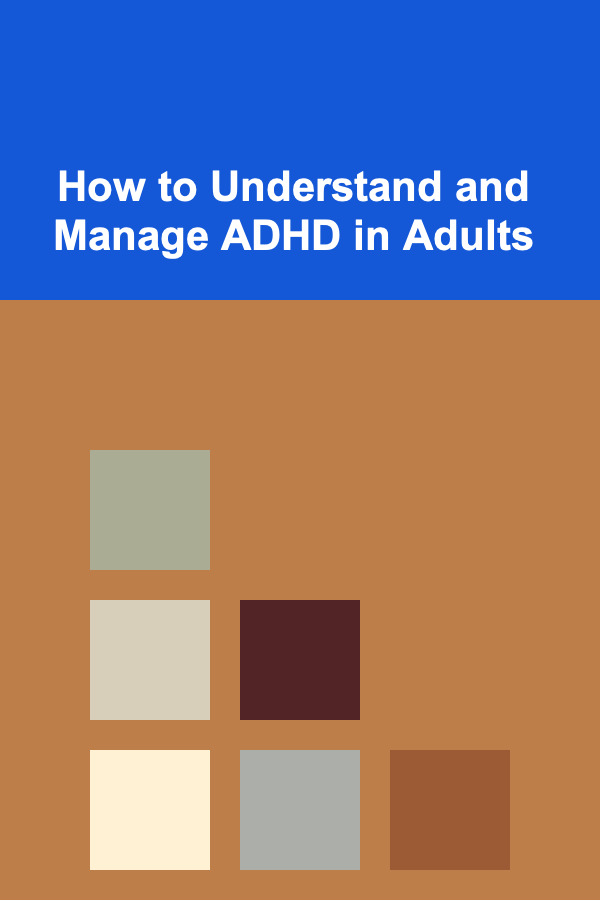
How to Understand and Manage ADHD in Adults
ebook include PDF & Audio bundle (Micro Guide)
$12.99$8.99
Limited Time Offer! Order within the next:

Attention-Deficit/Hyperactivity Disorder (ADHD) is often thought of as a childhood condition, with most individuals diagnosed in their early years. However, ADHD doesn't just disappear when a person grows older. In fact, many adults live with ADHD, sometimes unaware of the condition or struggling with its symptoms in silence. Understanding and managing ADHD in adults is crucial for improving quality of life, reducing stress, and fostering a sense of control. This comprehensive guide delves into the science of ADHD, its impact on adults, strategies for management, and effective treatments.
What Is ADHD?
ADHD is a neurodevelopmental disorder that affects both children and adults, although it is more commonly diagnosed in children. The hallmark traits of ADHD include inattention, hyperactivity, and impulsivity, but they can manifest in different ways across the lifespan.
In children, these symptoms often present in overt, observable ways such as difficulty sitting still in class, forgetting homework, or interrupting conversations. However, in adults, these symptoms may be more subtle and manifest in ways that can be easily misunderstood as laziness or irresponsibility. Many adults with ADHD struggle with managing time, meeting deadlines, maintaining relationships, and organizing tasks.
ADHD is thought to be caused by a combination of genetic and environmental factors. Brain imaging studies have shown that people with ADHD tend to have differences in the size and activity of certain brain regions, particularly those responsible for attention and impulse control.
Symptoms of ADHD in Adults
ADHD in adults can often be mistaken for other mental health conditions, such as anxiety or depression. Therefore, recognizing the specific symptoms of adult ADHD is crucial for obtaining an accurate diagnosis. Here are some common symptoms in adults:
1. Inattention
- Chronic forgetfulness: Adults with ADHD may struggle to remember appointments, deadlines, or even simple daily tasks.
- Difficulty focusing: Individuals often have trouble focusing on tasks, particularly those that are mundane or repetitive.
- Lack of organization: Managing time, keeping track of assignments, and staying organized can be overwhelming for adults with ADHD.
- Procrastination: A tendency to delay tasks until the last minute or avoid tasks altogether.
- Frequent distractions: Adults with ADHD may find themselves easily distracted by external stimuli or their own thoughts, making it hard to stay on track.
2. Hyperactivity and Impulsivity
- Restlessness: A feeling of constant agitation or the need to move, which may manifest as fidgeting or tapping.
- Impulsive decisions: Adults with ADHD may make rash decisions without fully considering the consequences.
- Interrupting others: They might find themselves interrupting conversations, finishing other people's sentences, or being impatient in social situations.
- Difficulty relaxing: It can be difficult to unwind or engage in activities that require prolonged calm or focus, such as reading or watching TV.
3. Emotional Regulation
- Mood swings: ADHD in adults is often accompanied by difficulty managing emotions, leading to frequent mood shifts.
- Low frustration tolerance: Even minor inconveniences or disruptions can trigger intense frustration or irritability.
- Low self-esteem: A pattern of struggling with tasks or feeling misunderstood may contribute to chronic feelings of inadequacy.
Impact of ADHD on Adult Life
ADHD in adults can have a profound impact on many aspects of life. While some may experience mild symptoms, others can find it significantly impairing. The effects of ADHD can permeate work, relationships, and overall well-being, creating challenges in managing responsibilities and maintaining a balanced life.
1. Professional Life
- Poor job performance: Difficulty focusing, staying organized, and meeting deadlines can lead to underachievement in the workplace.
- Frequent job changes: Many adults with ADHD struggle to maintain a consistent career due to difficulties with long-term planning or handling job-related stress.
- Relationship with coworkers: Impulsivity or difficulty with social cues can cause interpersonal issues with colleagues or supervisors.
2. Relationships
- Misunderstandings with partners: Adults with ADHD may forget important dates or appointments, leading to frustrations in romantic relationships.
- Parenting challenges: Managing the demands of parenthood while also dealing with ADHD symptoms can be overwhelming for some adults.
- Friendship strain: ADHD can make it difficult to keep in touch with friends or engage in social activities consistently, leading to feelings of isolation.
3. Mental Health and Well-being
- Co-occurring conditions: ADHD in adults often coexists with other mental health issues such as anxiety, depression, and substance abuse.
- Chronic stress: Adults with untreated ADHD often experience chronic stress from managing everyday tasks and maintaining an organized life.
- Burnout: Over time, the challenges associated with ADHD can lead to emotional exhaustion, burnout, and difficulty finding joy or satisfaction in daily activities.
Diagnosing ADHD in Adults
ADHD is often undiagnosed in adulthood because the symptoms can be mistaken for other conditions or attributed to life circumstances. However, seeking a proper diagnosis is crucial in order to start managing the condition effectively.
1. Clinical Evaluation
A thorough evaluation typically involves:
- A detailed interview with a mental health professional or psychiatrist.
- Discussion of symptoms, medical history, and family history of ADHD or other mental health conditions.
- Use of diagnostic tools, such as ADHD rating scales or checklists.
2. Rule Out Other Conditions
Since many of the symptoms of ADHD overlap with other disorders (e.g., anxiety, depression, sleep disorders), it is essential to rule out other possible causes for the symptoms.
3. Self-Reports and Questionnaires
Many professionals will ask the individual to complete questionnaires or surveys that assess ADHD symptoms. These tools help in understanding the severity and impact of the symptoms.
Strategies for Managing ADHD in Adults
Managing ADHD is a multi-faceted process that typically includes behavioral strategies, lifestyle changes, therapy, and medication. It's important to note that what works for one person may not work for another, so a personalized approach is often necessary.
1. Behavioral Strategies
- Time management techniques: Adults with ADHD benefit from structured schedules and tools like calendars, timers, and reminder apps. Breaking tasks into smaller, manageable steps helps prevent overwhelm.
- Prioritization: Learning to prioritize tasks can help individuals stay on track and avoid procrastination. Using lists or categorizing tasks by urgency can improve productivity.
- Creating a supportive environment: Organizing the workspace and minimizing distractions can help individuals with ADHD focus better.
2. Therapy and Counseling
- Cognitive-behavioral therapy (CBT): CBT is effective in addressing the negative thought patterns that often accompany ADHD, such as low self-esteem and chronic procrastination. It can help adults learn new coping strategies and manage their emotions.
- Coaching: ADHD coaching focuses on practical life skills such as organization, goal-setting, and decision-making. Coaches can work one-on-one with individuals to build stronger executive function skills.
- Mindfulness and relaxation techniques: Mindfulness can help reduce the impulsivity and emotional dysregulation associated with ADHD. Relaxation techniques, such as meditation or deep breathing exercises, can improve focus and overall mental health.
3. Medication
Medications are often used in combination with therapy and behavioral strategies to manage ADHD symptoms. The two primary classes of medications used to treat ADHD are:
- Stimulants: Stimulants, such as methylphenidate (Ritalin) or amphetamines (Adderall), are the most commonly prescribed medications for ADHD. These medications work by increasing the levels of certain neurotransmitters in the brain, improving focus and impulse control.
- Non-stimulants: For those who do not respond well to stimulants or experience side effects, non-stimulant medications such as atomoxetine (Strattera) may be used. These medications work differently by affecting norepinephrine levels in the brain.
4. Lifestyle Modifications
- Exercise: Regular physical activity has been shown to improve focus and reduce impulsivity in individuals with ADHD. Exercise helps regulate dopamine and norepinephrine levels, which are involved in attention and behavior.
- Diet: A balanced diet that supports brain health can play a significant role in managing ADHD symptoms. This includes consuming adequate protein, omega-3 fatty acids, and vitamins.
- Sleep: Sleep hygiene is crucial for individuals with ADHD, as lack of sleep can exacerbate symptoms such as irritability and difficulty focusing. Establishing a consistent sleep schedule and creating a relaxing bedtime routine can improve overall functioning.
Conclusion
ADHD in adults can present a unique set of challenges that affect various areas of life. While the symptoms can be difficult to manage, they are not insurmountable. Understanding ADHD, its impact on life, and the available treatment options is key to living a fulfilling life despite the condition. With the right diagnosis, strategies, and support, adults with ADHD can thrive both personally and professionally. Whether through therapy, medication, or lifestyle changes, managing ADHD is an ongoing process, but it is entirely possible to lead a successful, balanced life.

How to Maximize Space in Your Entryway with Smart Storage Solutions
Read More
How to Partner with a Construction and Maintenance Company for Home Projects
Read More
How to Turn Your Love of Beauty into an Online Makeup Business
Read More
How to Use a Binder for Essential Oil Recipes and Tips
Read More
How to Leverage Affiliate Marketing for Income: A Comprehensive Guide
Read More
How to Tackle the MCAT Prep To-Do List: A Step-by-Step Guide
Read MoreOther Products

How to Maximize Space in Your Entryway with Smart Storage Solutions
Read More
How to Partner with a Construction and Maintenance Company for Home Projects
Read More
How to Turn Your Love of Beauty into an Online Makeup Business
Read More
How to Use a Binder for Essential Oil Recipes and Tips
Read More
How to Leverage Affiliate Marketing for Income: A Comprehensive Guide
Read More